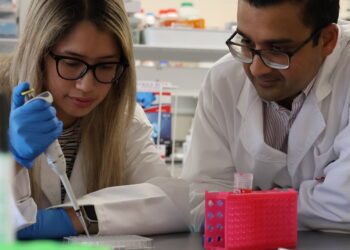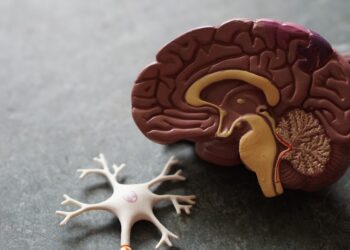Anyone who has experienced the very real emotion of ‘hanger’ (anger from being hungry) before knows all too well just how closely our stomach and our brain are linked. The reality, however, goes even deeper than that and it’s not just eating, but what we’re eating that can change our moods.
We spoke to Naturopathic Doctor and Medical scientist Ann Vlass N.D; B.Sc (Hons) about the link between diet, mood disorders, brain chemistry and specific nutrient deficiencies.
Are you moody and don’t know why?
Our moods are greatly dependent on the correct functioning brain chemical messengers known as neurotransmitters. These messengers come in many different forms.
Some neurotransmitters help make us feel good and arouse us; others help restrict pain, make us more alert, motivate us, improve our memory, and calm and focus our mind. However, these messengers require specific nutrients derived from our diet to work correctly. So, it is true when we say, ‘you are what you eat’. Food for thought!
Our brain chemistry is like a radio signal.
Neurotransmitters are brain chemicals that transmit a particular signal to and from neurons (nerve cells). Many of these transmitting signals are responsible for making us feel in different ways. Think of them as different radio signals, sending messages throughout our nervous system and ‘tuning’ us into different moods. When this transmission is not sent in a proper way, then the brain functioning will be disturbed and mood disorders such as depression can result. The role of neurotransmitter dysfunction in mood disorders has been established for a long time and can be tested through specific integrative pathology tests.
Some neurotransmitters and how they make us feel:
- endorphins (mood elevating, “upper”)
- adrenaline/ noradrenaline (controls stress response)
- dopamine (stimulates desire and reward)
- oxytocin (the ‘cuddle hormone’, emotional attachment, mother-baby bonding, orgasm)
- acetylcholine (alertness, memory, sexual performance)
- phenylethylamine (the “love drug”, bliss, infatuation…high levels found in chocolate!)
- enkephalins (pain restrictor)
- Gamma Amino Butric Acid (GABA) (anti stress, calm, focus)
- serotonin (mood elevating) melatonin (body clock, sleep inducer)
Neurotransmitters are generated by nutrients.
We all know that eating healthy food makes us feel better – even if we don’t always like to admit it!
Certain nutrients found in foods can alter neurotransmitter production in the brain and affect how we feel. The levels and possibly function of several neurotransmitters such as serotonin and dopamine, can be influenced by the supply of their nutrient precursors such as folic acid (vitamin B9), vitamin B6, zinc and vitamin C. These nutrients are found in fruits, vegetables, nuts and seeds. Without them, neurotransmitters cannot function. In fact, studies have shown that up to 35% of depressed patients are folic acid deficient.
Examples of nutrients/foods and their impact on our moods:
Magnesium and Vitamin B6: Research indicates a strong role for nutritional supplementation in the support of attention deficit hyperactivity disorder (ADHD). Numerous studies suggest that alterations in magnesium and vitamin B6 status might contribute to ADHD. Magnesium and vitamin B6 supplementation may produce significant effects in correction of changes seen in ADHD.
Omega-3 and Tryptophan: There are plenty of foods high in nutrients to boost serotonin levels. Serotonin deficiency can cause problems like depression, insomnia and carbohydrate cravings. Eat fatty fish like salmon, herrings, tuna, sardines, and mackerel, or take omega-3 supplements daily (only the high potency ones prescribed by naturopathic clinics).
Protein contains amino acids such as tryptophan, which helps convert serotonin levels in the brain. However, protein-rich foods alone can block serotonin production, so it may explain why people who feel down or depressed prefer carb-loaded meals and snacks. Carbohydrate is needed together with tryptophan to raise serotonin levels in the brain.
Therefore, eat protein along with vegetables, nuts, milk, beans, peas, avocados or bananas. All of these can produce a temporary increase in brain serotonin – and a subsequent calming or anxiety-reducing effect.
Try to avoid refined carbs such as white flour and sugary foods. These will boost serotonin levels short-term, then suddenly drop causing fatigue. What makes this an even worse state of affairs is that the carb-serotonin effects are short-lived. So a couple of hours later, having stored a whole lot of energy into your body due to the insulin spike that follows a carb meal, you are feeling flat because the serotonin has worn off and due to low blood sugar levels.
This explains why people may feel happy and then drowsy in the afternoon after eating pasta or after a Christmas meal, since a rise in serotonin in the brain can also lead to drowsiness.
Other Amino Acids: Protein-rich foods also contain amino acids such as glutamine and phenylalanine which generally make us feel alert and improve concentration. These are commonly found in fish, chicken, red meat, cheese, eggs and beans.
So, if you feel very down and tired in the mornings, have some scrambled eggs rather than a carb-laden cereal. You will elevate your alertness and concentration for the next 3 hours far more than you will by saving the ten minutes preparation time lying in bed hitting the snooze button repeatedly.
Dopamine Releasers: Cocoa and chocolate increase our feel-good brain chemistry by activating dopamine release. As dopamine activates our ‘reward pathway’, and along with the sugar content it is understandable why we feel addicted to chocolate.
Salsolinol seems to be one of the main psychoactive compounds present in cocoa and chocolate and might be included in chocolate addiction. Chocolate consumption stimulates the release of serotonin (from the sugar) and endorphins (from the fat), which combine to produce a relaxed or euphoric feeling.
Phenylethylamine, our ‘love drug’ endorphin-like chemical, is thought to be the reason why chocolate is said to be an aphrodisiac. This chemical mimics the brain chemistry of a person in love, so when levels are high in the body it relieves depression from unrequited love. This is one of the reasons so many women love to eat chocolate when they break up – it really is a mood elevator!
This may also explain why some people crave chocolate when they’re feeling down or depressed. I would suggest that you choose minimum 80% dark chocolate to avoid the sugar content of milk or compound chocolate, and would supplement with the appropriate neurotransmitter nutrient precursor.
In a therapeutic capacity, such as our clinic, specific nutrient, food and supplement combinations can be used to safely and quickly provide suitable necessary ingredients for the body to properly manufacture and use its own neurotransmitters rather than relying on pharmaceutical drugs to do the work.
A good night’s sleep makes you less moody.
Neurotransmitters are naturally depleted during the course of each waking day. The brain manufactures and replenishes them while you are sleeping. Thus a good quality of (continuous) night’s sleep i
s very important, both in treating and preventing a range of mental illnesses such as depression.
This may be the reason why so many people who suffer from depression seem to want to hibernate – it may be the body’s innate mechanism to help produce more neurotransmitters. Unfortunately, many depressive states lead to and worsen poor quality sleep, so it is a vicious cycle. This is why I prescribe specific nutrients and herbs to patients.
Another way neurotransmitters are depleted (or reabsorbed) is through stress. Your brain reabsorbs the neurotransmitters it has manufactured to fight that stress, and this re-absorption means it is not available for use. Not having enough neurotransmitters means you end up feeling ‘wound up’ as the body’s compensation for stress is depleted.
At our clinic we aim to re-establish neurotransmitter balance as the first step of support of the mood disorder, but this must be followed with adequate assessment and treatment of the causative factors that have triggered the imbalance. Therapies would include changes in food and lifestyle choices and eating habits, eliminating dietary allergy triggers, treatment of the digestive system, detoxification and possible heavy metal clearance.
References:
Brambilla, P., et al., GABAergic dysfunction in mood disorders. Mol Psychiatry, 2003. 8(8): p. 721-37.
Parry, B.L., The role of central serotonergic dysfunction in the aetiology of premenstrual dysphoric disorder: therapeutic implications. CNS Drugs, 2001. 15(4): p. 277-85.
Ressler, K.J. and C.B. Nemeroff, Role of serotonergic and noradrenergic systems in the pathophysiology of depression and anxiety disorders. Depress Anxiety, 2000. 12(1): p. 2-19. Young, S.N. and M. Leyton, The role of serotonin in human mood and social interaction. Insight from altered tryptophan levels. Pharmacol Biochem Behav., 2002. 71(4): p. 857-65. Young, S., Behavioural effects of dietary neurotransmitter precursors: basic and clinical aspects. Neurosci Biobehav Rev., 1996. 20(2): p. 313-23.
Fernstrom, J., Dietary precursors and brain neurotransmitter function. Annu Rev Med., 1981. 32: p. 413-25 7
Fugh-Berman, A. and J.M. Cott, Dietary Supplements and Natural Products as Psychotherapeutic Agents. Psychosomatic Medicine, 1999. 61: p. 712-728.
Kozielec, T. and B. Starobrat-Hermelin, Assessment of magnesium levels in children with attention deficit hyperactivity disorder (ADHD). Magnes Res, 1997. 10(2): p. 143-8. Nogovitsina, O. and E. Levitina, Neurological aspects of the clinical features, pathophysiology and corrections of impairments in attention deficit hyperactivity disorder. Neuroscience and Behavioural Physiology, 2007. 37: p. 199-202.
Mood-Food Relationships – effects, nutrition, body, diet, absorption, carbohydrate, protein, fat, eating, carbohydrates, amino, habits, Effects of Neurotransmitters, Size of Meal https://www.faqs.org/nutrition/Met-Obe/Mood-Food-Relationships.html#ixzz14h1CmxJP
In vitro pharmacological activity of the tetrahydroisoquinoline salsolinol present in products from Theobroma cacao L. like cocoa and chocolate. Melzig MF, Putscher I, Henklein P, Haber H. 1-2, s.l. : J Ethnopharmacol., 2000, Vol. 73.
Tomaso, E.d., M. Beltramo, and D. Piomelli. Brain Cannabinoids in Chocolate. Nature, August 1996




















